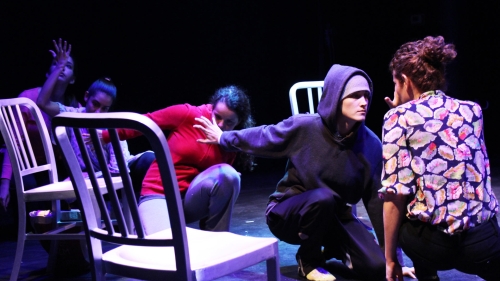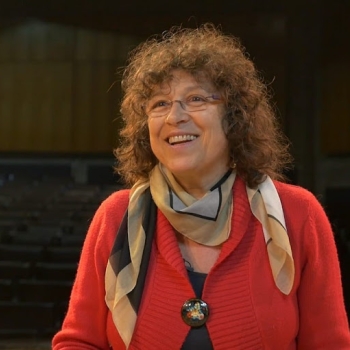

Susana Pendzik (PhD, RDT) Associate Professor and Former Head of the Drama Therapy Graduate Program at Tel Hai Academic College (Israel), lectures also at the Theatre Studies Department of the Hebrew University of Jerusalem, the Swiss Dramatherapy Institute, the Institute of Theatertherapy in Berlin, and the University of Cuyo, Mendoza, Argentina, as well as in other institutions of higher education in Europe and Latin America and the US. Susana is an honorary member of the Swiss Dramatherapy Association, honorary member and senior supervisor of the Association of Creative Arts Therapies in Israel (YAHAT), and former representative of Israel at the European Federation of Dramatherapy and at the World Alliance for Dramatherapy. Published poetess, theatre director, and researcher, Susana is the author of numerous publications in drama therapy, including a book on Group work with abused women (in Spanish and German, 1999), co-editor of Assessment in drama therapy (2012) and of The self in performance: Autobiographical, self-revelatory, and autoethnographic forms of therapeutic theatre (2016), and co-author of Dramaterapia: Un enfoque creativo para el trabajo terapéutico. She is a supervisor and has a private practice.
Areas of Interest:
Drama Therapy; Theatre-based Research; Autobiographical Therapeutic Performance; Therapeutic Theatre; Drama Therapy and Digital/New Media; Drama and Theatre as Assessment Tools in Psychotherapy; Multiculturalism and Gender in the Creative Arts Therapies.
Recent Research
De/constructing the past, constructing future: A Theatre-Based and Trauma-Sensitive Research Project on the Perception of the Holocaust by German Youngsters in Berlin
Susana Pendzik, Ingrid Lutz, and Jutta Heppekausen
The trauma of the Holocaust has left indelible sequels in the collective memory of Germans of all origins, shaping their sense of identity and their attitudes towards “self” and “other.” Although many resources have been devoted to process the Holocaust, the transmission of its legacy to the next generations has not always been done constructively. As Germany struggles with the pandemic, migration challenges, fundamentalism, political and economic uncertainty, racism, juvenile violence, etc., some of the issues embedded in this legacy are clearly resurfacing.
The current pilot used drama therapy methods in order to gather images and narratives held by 9th graders concerning the Holocaust in different schools in Berlin. The youngsters were considered the ‘source.’ Drama therapy sessions were held, aimed at evoking the topic, without imposing a particular outlook. The material collected from all the schools, was articulated by the team as a filmed theatrical piece and performed it to the youngsters, as a resonance of their input. Both performance and process constitute a platform for further dialogue and intervention.
Awards
1994 – Encouragement Scholarship Prize for PhD students, Bar-Ilan University
1995 – Encouragement Scholarship Prize for PhD students, Bar-Ilan University
1995 – The Rector’s Prize for Academic Excellence, Bar-Ilan University
2009 – The Body of Acknowledgement Certificate, for a significant contribution in the National Association for Drama Therapy’s Body of Knowledge.
2014 –Teaching Excellence Award. Tel Hai Academic College, MA Program in Arts Therapies – Drama Therapy.
2017 – Professional Contribution Appraisal Certificate. YAHAT (The Association of Creative and Expressive Therapies of Israel).
2019 – Recipient of the Honorary Membership and Recognition Award. YAHAT (The Association of Creative Arts Therapies of Israel).http://dramatherapie-academy.thinkific.com/courses/six-key-model
Selected Publications
Books as author
- Pendzik, S. (1992). Handbook of action techniques for working with battered women [Spanish]. Xalapa, Mexico: Colectivo Feminista de Xalapa in cooperation with Solidaritëtssond Der Grüner (reprinted 1995).
- Pendzik, S. (1996). Group work with abused women. [German]. Munich: AG-SPAK-Bücher in cooperation with the German Paulo Freire Association (reprinted 1999).
- Pendzik, S. and Levy, L. (2018). Drama Therapy: A creative approach for therapeutic work [Spanish]. Madrid: Editorial Síntesis.
Edited Books
- Johnson, D., Pendzik, S., & Snow, S. (Eds.). (2012). Assessment in drama therapy. Springfield, Ill.: Charles C. Thomas Publisher.
- Pendzik, S., Emunah, R, and Johnson, D. (Eds.) (2017). The self in performance: Autobiographical, self-revelatory, and auto-ethnographic forms of therapeutic theatre. New York: Palgrave-Macmillan.
Articles in Refereed Journals
- Pendzik, S. (1988). Drama therapy as a form of modern shamanism. The Journal of Transpersonal Psychology, 20(1), 81-92.
- Pendzik, S. (1988). Dramatheapy on abuse: A descent to the underworld. Dramatherapy, 11(2), 21-28.
- Pendzik, S., & Sotomayor, L. (1991). Training battered women’s counsellors: A dramatherapy lab. Dramatherapy, 13(2), 15-19.
- Pendzik, S. (1993). Considerations on shamanism, drama, and therapy practices: The case of Doña Joaquina, Terapia VeOmanuiot, (Journal of the Israeli Association of Creative and Expressive Therapies) [Hebrew] 1(2), 7-23.
- Pendzik, S. (1994). The theatre stage and the sacred space: A comparison. The Arts in Psychotherapy, 21(1), 23-35.
- Pendzik, S. (1995). Female presence in Tirso”s El burlador de Sevilla. Bulletin of the Comediantes, 47(2), 165-181.
- Pendzik, S. (1998). Dramatherapy: Towards the 21st century. Terapia VeOmanuiot [Hebrew], 2(3), 24-25.
- Pendzik, S. (2003). Six keys for assessment in dramatherapy. The Arts in Psychotherapy, 30, 91-99.
- Pendzik, S. (2005). The games of Fernando. El Extramundi y Los Papeles de Iria Flavia, (special issue on Fernando Arrabal) [Spanish] 11(41), 93-107.
- Pendzik, S. (2005). An integrative model of assessment in drama therapy, Terapia Beemtzaut Omanuiot [Hebrew] 3(3), 28-40.
- Pendzik, S. (2006). On dramatic reality and its therapeutic function in drama therapy. The Arts in Psychotherapy, 33, 271-280.
- Pendzik, S. (2008). Dramatic Resonances: A technique of intervention in drama therapy, supervision, and training. The Arts in Psychotherapy, 35, 217-223.
- Pendzik, S. (2008). Using the 6-Key Model as an intervention tool in drama therapy. The Arts in Psychotherapy, 35, 349-354.
- Pendzik, S. (2010). The 6-key model as an instrument of intervention in drama therapy. Ar-té – Quaderni Italiani delle artiterapie. [Italian] (Translation of 2008) 5(8), 4-16.
- Pendzik, S., & Raviv, A. (2011). Therapeutic clowning and drama therapy: A family resemblance. The Arts in Psychotherapy, 38, 267-275.
- Grinberg, Z., Pendzik, S., Kowalsky, R., & Goshen, Y. (2012). Drama therapy role theory as a context for understanding medical clowning. The Arts in Psychotherapy, 39(1), 42-51.
- Pendzik, S. (2013). The 6-key model and the assessment of the aesthetic dimension in dramatherapy. Dramatherapy, 35(2), 90-98.
- Pendzik, S. (2015). Dramatic reality: Definition and therapeutic value. Academic Journal of Creative Arts Therapies, [Hebrew], 5(1), 520-532.
- Pendzik, S. (2015). On dramatic reality and its therapeutic implications. Investigación teatral: Revista de Artes Escénicas y Performatividad [Spanish] 4-5(7-8), 97-119.
- Pendzik, S. (2017). The creative explosion of experimental theatre: The Latin American perspective. Drama Therapy Review, 3(2), 313-320.
- Gordon. J., Shenar, Y. and Pendzik, S. (2018). Clown therapy: A drama therapy approach to addiction and beyond. The Arts in Psychotherapy, 57, 88-94.
- Pendzik, S. (2018). Drama therapy and the invisible realm. The Drama Therapy Review, 4(2), 182-197.
- Schwartz, R. & Pendzik, S. (2019). From the world of education to the world of drama therapy: Keys to a popular career journey” [Hebrew]. Ben Hamilim, 16, 67-87.
- Atsmon, A. and Pendzik, S. (2020). The clinical use of digital resources in drama therapy: An explorative study of well-established practitioners. The Drama Therapy Review, 6(1), 7-26.
- Pendzik, S, (2020). The dialectics of technology in drama therapy. Drama Therapy Review, 6(2) Supplement, 69-73.
- Ray, P. and Pendzik, S. (2021). Autobiographical therapeutic performance as a means of improving executive functioning in traumatized adults. Frontiers in Psychology – Health Psychology. Research Topic Title: The Psychological and Physiological Benefits of the Arts, 12, 599914.
- Pendzik, S. (2021). Performance-based drama therapy: Autobiographical performance as a therapeutic intervention. PÓS: Journal of the Arts Postgraduation Program at EBA/UFM, 11(23), 245–262 [English and Spanish].
- Mashiach, H. and Pendzik, S. (2021). Framing a period: Switching to online drama therapy and art therapy in elementary schools due to the Coronavirus pandemic during the first lockdown [Hebrew]. Academic Journal of Creative Arts Therapies (AJCAT), in press.
Articles or chapters in refereed books
- Pendzik, S. (1997). Dramatherapy and violence against women. In S. Jennings (Ed.), Dramatherapy: Theory and practice, Vol. 3. (pp. 221-233). London: Routledge.
- Pendzik S. (2004). Reflections on shamanism and dramatherapy practices. In R. Krey and V. Merz (Eds.), Feministic reflections. (pp. 142-161) [German] St Gallen, Switzerland: BoD, Nordersted & Iff-Forum.
- Pendzik, S. (2012). The 6-key model: An integrative assessment approach. In D. Johnson, S. Pendzik, S. Snow (Eds.), Assessment in drama therapy (pp. 197-222). Springfield, Il: Charles C. Thomas.
- Pendzik, S., Snow, S., Johnson, D. (2012). State of the art in drama therapy assessment. In D. Johnson, S. Pendzik, S. Snow (Eds.), Assessment in drama therapy (pp. 46-57). Springfield, Il: Charles C. Thomas.
- Snow, S., Johnson, D., Pendzik, S. (2012). History of assessment in the field of drama therapy. In D. Johnson, S. Pendzik, S. Snow, (Eds.), Assessment in drama therapy (pp. 5-30). Springfield, Il: Charles C. Thomas.
- Johnson, D., Pendzik, S., Snow, S. (2012). Concepts and principles of assessment in drama therapy. In D. Johnson, S. Pendzik, S. Snow, (eds.), Assessment in drama therapy (pp. 31-45). Springfield, Il: Charles C. Thomas.
- Pendzik, S. et al. (2014). Dramatherapy exercices. In D. Mueller-Weith, N. Dudek, & K. Wuhrl-Struller (Eds.), Dramatherapeutic practice: A collection of exercises [German] Berlin, Germany: Schibri Verlag.
- Pendzik, S. and Poupko, G. (2014). Making sense of the acts. In: R. Ranasinha (Ed.), How schools abuse and fail children: Dramatherapy to heal emotionally traumatized school children in Sri-Lanka (pp.119-136). Sri Lanka: Hare Printers & Deepa Centre for Community Development and Peace Building.
- Pendzik, S. and Oren, G. (2015). Opening doors: The 6-key model and attachment skills. In R. Berger (Ed.), Observing the art, seeing the soul: New methods and approaches in arts-based assessment and supervision. [Hebrew], (73-98). Kiryat Bialik: Ach Publishers.
- Pendzik, S. (2016). Dramatherapy and the feminist tradition. In S. Jennings and C. Holmwood, (Eds.), The international handbook of dramatherapy (pp.306-316). London: Routledge.
- Pendzik, S., Emunah, R, and Johnson, D. (2017). The self in performance: context, definitions, directions. In: The self in performance: Autobiographical, self-revelatory, and auto-ethnographic forms of therapeutic theatre (pp.1-18). New York: Palgrave-Macmillan.
- Pendzik, S. (2017). The dramaturgy of autobiographical therapeutic performance. In: S. Pendzik, R. Emunah, & D. Johnson, The self in performance: Autobiographical, self-revelatory, and auto-ethnographic forms of therapeutic theatre (pp.55-69). New York: Palgrave-Macmillan.
- Pendzik, S. (2017). The Six Keys: An integrative and qualitative model of assessment, evaluation, and intervention in drama therapy. In G. Schuchner and D. Ferrandis (Eds.), Dramatherapy: Theory and practice – Resources and techniques to treat the challenges of life. [Spanish] (pp.147-157). Buenos Aires: Letra Viva.
- Pendzik, S. (2019). Dramatic resonances as a therapeutic intervention based on playback theatre. In R. Kowalsky, N. Raz. & Sh. Keisari (Eds.) (2019). The hall of mirrors on stage: Psychotherapy in playback theatre [Hebrew] (pp.168-187). Haifa: The E. Sagol Creative Arts Therapy Research Centre, Haifa University.
- Maimoni, T., Pendzik, S., Bachach, B., (2019). Dialogue between languages: Video and Drama Therapy – A case study of youngsters diagnosed with language and communication impairments. In A. Orr, Sh. Goffer, O. Glass, and A. Sabag (Eds.), Depth of the field: Emotional, therapeutic and social aspects of photography (pp. 184-199) [Hebrew]. Jerusalem: Musrara, The Naggar School of Art and Society.
- Pendzik, S. (2019). On princesses and dragons: Women and anger. In M. Doron Harari (Ed.), Why making a drama out everything? [Hebrew] (pp. 111-127). Even Yehuda: Hamatzia.
- Oren, G. and Pendzik, S. (2020). “The ‘terror of the school’ learns to play.” In S. Jennings and C. Holmwood (Eds.), The Routledge international handbook of play, therapeutic play and play therapy. (pp. 237-247). London & New York: Routledge.
- Pendzik, S. (2022). Approaching personal stories through dramatic resonances in group work. In R. Kowalsky, N. Raz, and S. Keisari. Psychotherapeutic playback theatre: Abingdon, Oxon & New York: Taylor and Francis. In press.
On-line Courses
- Pendzik, S. (2016). The Six-Key Model online course: An integrative drama therapy-based approach to assessment. Dramatherapie On-Line Academy. Co-producer, content creator, and instructional designer. MD Stream and Swiss Dramatherapy Institute.
